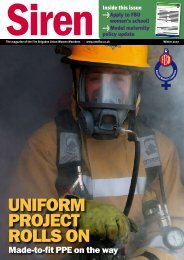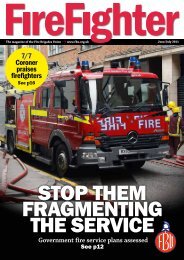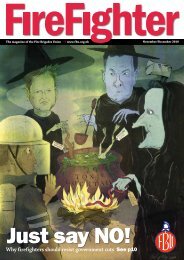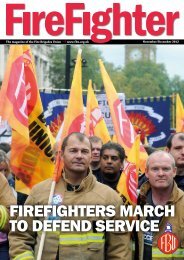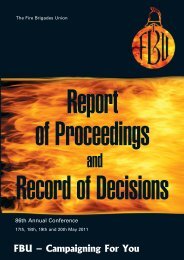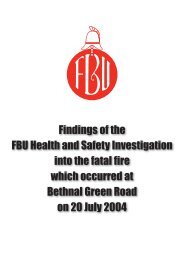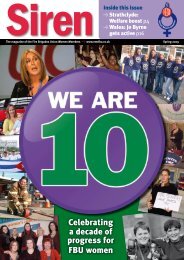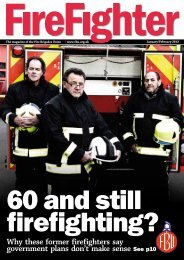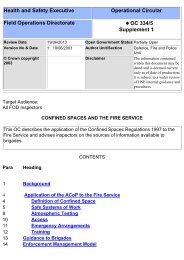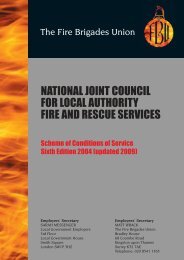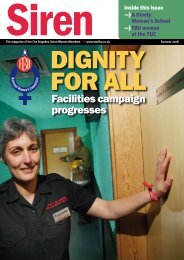Report - Fire Brigades Union
Report - Fire Brigades Union
Report - Fire Brigades Union
Create successful ePaper yourself
Turn your PDF publications into a flip-book with our unique Google optimized e-Paper software.
SECTION B — FIRE AND RESCUE SERVICE POLICY<br />
should be a requirement for FRAs to consult their staff on<br />
the formation of mutuals. We also think that FRAs should<br />
be required to consider commissioning their fire and<br />
rescue service from other providers. This will help to act as<br />
a catalyst for this and other important changes, and may<br />
spark alternative forms of delivery, such as management<br />
buy-outs based on a social enterprise philosophy.<br />
●<br />
●<br />
Government should clarify its expectations of what<br />
local services should do to ensure the security and<br />
resilience of the UK;<br />
The Government should have a role working with the<br />
sector to identify signs of service failure, working with<br />
the sector to intervene only as required.<br />
Decentralisation and localism to be underpinned by a<br />
new National Framework<br />
The need for the National Framework to underpin<br />
standards has already been mentioned. We have given<br />
considerable thought to the role of a National Framework,<br />
within a decentralised sector.<br />
We see a strong case for retaining the National Framework<br />
and the national and government roles should be more<br />
about enabling public accountability to flourish by<br />
facilitating better local leadership, well designed public<br />
engagement, and integration of effort with other local<br />
public services and the private sector. Service delivery<br />
should also consider what the public can reasonably<br />
expect. This means matching the roles of public safety<br />
organisations with community risks, making sure that<br />
those risks are managed by working collaboratively.<br />
The starting point for any change would be an understanding<br />
of public expectations about the service that is delivered to<br />
them and there are a set of reasonable expectations that<br />
appear time and time again. The expectations include:<br />
●<br />
●<br />
●<br />
●<br />
●<br />
A quick and effective high quality response and an<br />
expectation that all services can work together at<br />
emergencies;<br />
Being resilient and deal with threats to national security<br />
– to respond effectively and work together with other<br />
safety services so our communities and our way of life,<br />
including our important infrastructure is protected;<br />
Helping them understand how to prevent incidents, by<br />
being educated, informed and involved in improving<br />
their own safety;<br />
Being cost effective and deliver value for money. They<br />
expect that local leaders are held to account for the<br />
quality and cost of the service;<br />
Helping them to influence their public services and<br />
exercise a degree of choice and to do this in an<br />
informed way through knowing and understanding the<br />
level of local risk and what this means for them.<br />
The implications of this paper for the role of government<br />
primarily include:<br />
●<br />
The removal of prescribed tasks from the National<br />
Framework;<br />
Objectives for the sector are primarily to:<br />
● Further develop engagement with local people and give<br />
them a say in the services provided and enable them to<br />
make informed choices;<br />
●<br />
●<br />
●<br />
●<br />
●<br />
●<br />
To demonstrate that fire and rescue services deliver<br />
services that meet citizens’ need;<br />
Involve people more in their own safety through the<br />
concepts of localism and the Big Society;<br />
Move service provision from direct ownership towards<br />
a commissioned approach involving a wider group of<br />
providers;<br />
Revitalise IRMP – including the contribution to national<br />
resilience requirements and the wider local community<br />
safety agenda;<br />
Engage with the fire safety industry to improve skills,<br />
knowledge and competence;<br />
Take a holistic view of value for money and evaluate<br />
the cost to society of fires and emergency events to<br />
develop a better business case to improve fire<br />
protection to buildings and infrastructure.<br />
Changing the Financial Architecture<br />
The financial architecture by which budgets are allocated<br />
needs to be reformed to place budgets as close to the<br />
citizen as possible, and to free those budgets, as is the<br />
case with county FRAs, to spend them as they see fit. Any<br />
funding will need to take account of national<br />
responsibilities that the FRA would be expected to<br />
undertake. The physical contribution to these national<br />
services will be determined through a revised National<br />
Framework.<br />
Freedom and power emerges with the devolution of<br />
funding. Districts or boroughs should be free to remain<br />
within an existing FRA and simply make the funds<br />
available, or they could seek to break away and negotiate<br />
the level of service they require from the existing supplier<br />
or alternatives. Some may wish to procure from existing<br />
fire and rescue services, others may seek to involve the<br />
private sector. For fire and rescue services to receive<br />
funding directly they need to have the functions to them<br />
transferred which can be achieved under the Sustainable<br />
Communities Act 2007, as was proposed for Windsor and<br />
Maidenhead in 2008.<br />
●<br />
●<br />
A review of the funding architecture for FRAs to place<br />
fairness and choice at the heart of commissioning<br />
services that meet the needs of all communities;<br />
Governance arrangements should be changed to<br />
strengthen the role of its members;<br />
We also understand that formula grant is provided to those<br />
receiving authorities which exist as at 1 April of the year in<br />
question, and takes into account the services that they<br />
provide. If therefore there is a transfer of functions, then<br />
the grant will take this into account. We would hope that<br />
FBU Annual <strong>Report</strong> 2011 57





